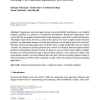244 search results - page 8 / 49 » On-Line Probability, Complexity and Randomness |
IPPS
1998
IEEE
14 years 1 months ago
1998
IEEE
We present a method by which any polynomial-time randomized distributed algorithm is transformed in such way that each participating process needs only polylog local random bits a...
ML
2012
ACM
12 years 4 months ago
2012
ACM
Dependency networks approximate a joint probability distribution over multiple random variables as a product of conditional distributions. Relational Dependency Networks (RDNs) are...
CRYPTO
2006
Springer
14 years 19 days ago
2006
Springer
Abstract. We consider the problem of random selection, where p players follow a protocol to jointly select a random element of a universe of size n. However, some of the players ma...
SIAMCOMP
2010
13 years 3 months ago
2010
This paper studies the inherent trade-off between termination probability and total step complexity of randomized consensus algorithms. It shows that for every integer k, the prob...
WSC
1997
13 years 10 months ago
1997
We consider the effect of common random numbers (CRNs) among simulated systems in two different multinomial selection procedures; the classical procedure BEM (Bechhofer, Elmaghr...

